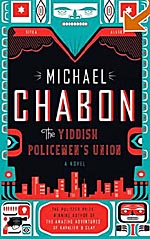
![]() jfrantz
jfrantz
3/31/2013
![]()
In Chabon's alternate history, European Jewish refugees were allowed to settle in Sitka, Alaska during WWII. Israel was destroyed after only a few months, and now after sixty years, the Federal District of Sitka is set to revert to the state of Alaska. In the midst of the gloom and the impending finality that surrounds the district and its inhabitants, Meyer Landsman, an alcoholic homicide detective, finds himself pulled inexorably into the murder investigation of the son of a powerful organized crime boss.
Reading in three dimensions
No one can deny that the Hugo list, which has tended to the representation of male and WASPy perspectives, could use an infusion of diversity. Some of my favorite Hugo's have been those that more inclusive of a wider array of human experience, but they're few and far between. I was pretty excited by the title, The Yiddish Policeman's Union, for that very reason. Chabon's win has the added benefit, or curse, of being the kind of book that tests our boundaries, and as a result, reaches fans outside the genre. And that's probably a good thing.
At the same time as I'm happy about this book as a kind of border crossing, I'm not a great fan of alternate history as SF. I'm not aware of much critical discussion regarding the topic, and maybe this is my fault. Maybe there is a true dearth of scholarship on the fringes of SF, I'm not sure. I suppose I should do some research. I do know that I don't find that the most often repeated justification holds water. After all, doesn't every book ask, "what if?", in some way or another?
Whatever your perspective of the appropriateness of considering this book, or alternate history in general, as a part of the Science Fiction/Fantasy universe, this book will hopefully be one that, years from now helps us to better understand the genre. Other than this, I feel pretty ambivalent about The Yiddish Policeman's Union.
Chabon in fact conceived of the book as a result of something of an odd question - What if there was a place that would necessitate a translation manual from English to Yiddish. What countries would such a manual (he happened across one called "Say it in Yiddish") be necessary?
Chabon's Sitka, Alaska, was a pretty wonderful exploration. There is a very real sense of place and space - a feeling of a living breathing place - which is the result of some truly great prose. It tricks you into grabbing hold of the direct and austere noir elements which he then slyly pokes holes in with unexpectedly sardonic witticism and cynical-yet-florid descriptions. The effect is that every street, building, and room, has something of a unique texture and feeling of actual depth. It felt like reading in three dimensions.
Despite amazingly great writing, I thought the story itself was lackluster at best. I'm normally a fool for a story with such dark and hopeless characters and places, but something kept me from really sinking into this one. Even by the end I didn't have any particular feelings about it. I hope it wasn't because I was forced to listen to the audiobook, but it could have been. There were countless times that I wish I could have lingered on a scene or phrase. I guess this is all good reason to return, at a time when I'm more prepared to give it some real effort. Honestly though, I don't know what would motivate me to do that.
The audiobook
When I started this decade, I was committed to "no more audiobooks". Then I checked out Susanna Clarke's mind-bogglingly long winner and felt I had no choice but to listen during my commute if I wanted to finish the Hugo's anytime soon. A vague awareness of the book's critical reception had only heightened my anticipation and I had been excited to read The Yiddish Policeman's Union for the cover alone so I was a little disappointed that I didn't get the feel of real pages.
Peter Riegert's reading was the perfect substitute. He was great for capturing the gritty-noir and the uncomfortable air of something impending. Perhaps his gruff sound took something from the moments of levity in Chabon's prose, but I loved every minute of his reading.
There is also an interview with Chabon at the end of the book which was helpful. I appreciated the better understanding of where Chabon was coming from, the genesis of Jewish Sitka, and his intentions.
Overall, I was happy with the audiobook. I don't know that I would really encourage anyone else to listen but if someone were anxious to, I wouldn't stop them.
Recommendation
Despite recognizing that this was an amazing book, I find myself deeply perplexed as to how it was nominated and won Best Novel. I'm not completely convinced that it belongs here and Chabon himself admits that he never thought of it as science fiction while writing it. I normally don't care much for what an artist thinks of their own work once it's in the public sphere, but in this case it seems telling. I'm not diametrically opposed to it winning, I just need better context. For everyone else, there's plenty to like here. Just know what you're getting into.
http://hugoenduranceproject.blogspot.com/2013/03/the-yiddish-policemans-union.html